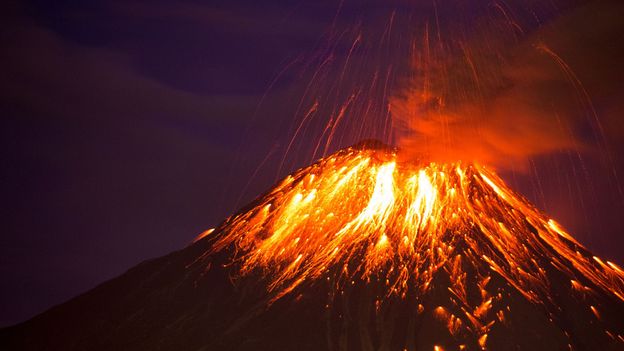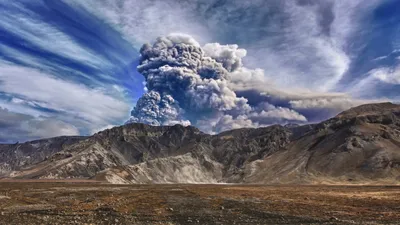In recent weeks, Britain has been facing an unusual environmental crisis—a volcanic gas cloud has spread across the country, prompting severe health warnings and widespread concern. This unprecedented situation highlights the intricate interplay between natural disasters and public health, and underscores the necessity for effective response strategies and individual preparedness. In this comprehensive article, we will delve into the nature of volcanic gas clouds, their potential health impacts, and practical advice for managing the associated risks.
Understanding the Volcanic Gas Cloud
Volcanic Gas Clouds: An Overview
Volcanic gas clouds are formed from gases and particulate matter released during volcanic eruptions. These clouds can be composed of a variety of gases, including sulfur dioxide (SO₂), carbon dioxide (CO₂), hydrogen sulfide (H₂S), and various other compounds. The gases are emitted into the atmosphere in substantial quantities and can be carried over long distances by wind currents.
When a volcano erupts, it releases a complex mixture of volcanic gases, ash, and steam. The composition of the volcanic gas cloud depends on the type of eruption and the geological characteristics of the volcano. For instance, explosive eruptions tend to release more ash and gases compared to effusive eruptions, which are characterized by lava flows.

The Science Behind Volcanic Gas Clouds
Volcanic gas clouds are created when magma rises to the surface and undergoes a series of physical and chemical changes. As magma ascends, the pressure decreases, allowing gases that were dissolved in the magma to escape. These gases then form a cloud that can rise high into the atmosphere and spread over vast areas.
Sulfur dioxide, one of the primary gases in volcanic clouds, reacts with moisture in the atmosphere to form sulfuric acid. This process can lead to acid rain, which further exacerbates environmental and health issues. Carbon dioxide, another major component, can accumulate in low-lying areas, displacing oxygen and posing additional risks to both people and animals.
The Health Risks of Volcanic Gas Clouds
Respiratory Health Concerns
One of the most pressing health concerns associated with volcanic gas clouds is their impact on respiratory health. Sulfur dioxide is known to irritate the respiratory tract, leading to symptoms such as coughing, wheezing, and shortness of breath. For individuals with pre-existing conditions like asthma or chronic bronchitis, exposure to these gases can trigger severe exacerbations and increase the risk of respiratory infections.
Fine particulate matter, often present in volcanic gas clouds, can penetrate deep into the lungs and enter the bloodstream, causing further health issues. Studies have linked prolonged exposure to particulate matter with cardiovascular diseases, lung cancer, and other serious health conditions.
Impact on Sensitive Groups
Certain populations are more vulnerable to the effects of volcanic gas clouds. These include:
- Children: Their respiratory systems are still developing, making them more susceptible to air quality changes and respiratory irritants.
- The Elderly: Older adults often have weakened immune systems and pre-existing health conditions that can be aggravated by poor air quality.
- People with Pre-existing Health Conditions: Individuals with asthma, chronic obstructive pulmonary disease (COPD), or other respiratory and cardiovascular conditions are at heightened risk.
Environmental and Psychological Effects
In addition to direct health impacts, volcanic gas clouds can have indirect effects on mental health and the environment. Persistent poor air quality can lead to increased stress and anxiety, particularly if the health risks are not well understood or managed. The visibility issues caused by thick clouds of volcanic gases can also disrupt daily life and contribute to a sense of uncertainty and unease.
Monitoring and Managing the Volcanic Gas Cloud
Government and Health Organization Responses
In response to the volcanic gas cloud crisis, government agencies and health organizations have ramped up their monitoring and advisory efforts. Agencies such as the UK Met Office and Public Health England are closely tracking the movement of the volcanic gas cloud and providing real-time updates and guidance to the public.
- Air Quality Monitoring: The Met Office and other environmental agencies have deployed air quality monitoring stations to assess the concentration of harmful gases and particulates. These measurements help determine the severity of the air quality and inform health advisories.
- Health Warnings and Advisories: Public Health England has issued health warnings and advice to help residents protect themselves. These advisories include recommendations to stay indoors, use air purifiers, and avoid strenuous outdoor activities during periods of poor air quality.
Individual Precautions and Protective Measures
Residents can take several steps to mitigate the health risks associated with volcanic gas clouds. Here are some practical tips for protecting yourself and your family:
- Stay Informed: Keep up to date with the latest information from local authorities and health organizations. Regularly check news updates and official websites for air quality reports and health advisories.
- Limit Outdoor Activities: Reduce outdoor activities, especially during periods of high air pollution. If you must go outside, limit the duration of exposure and avoid vigorous exercise.
- Create a Safe Indoor Environment: Use air purifiers with HEPA filters to reduce indoor air pollution. Keep windows and doors closed to prevent outdoor air from entering your home.
- Wear Protective Masks: N95 masks or other high-efficiency particulate air (HEPA) masks can help filter out harmful particulates from the air. These masks are particularly useful for individuals with respiratory conditions.
- Monitor Health Symptoms: Be vigilant about any symptoms related to respiratory or cardiovascular issues. Seek medical attention if you experience persistent or severe symptoms.
Community and Public Health Initiatives
Community support and public health initiatives play a crucial role in managing the impact of volcanic gas clouds. Local governments and non-profit organizations can organize awareness campaigns and provide resources for affected residents. Initiatives might include:
- Community Health Clinics: Setting up temporary health clinics to offer screenings and medical advice to those affected by the volcanic gas cloud.
- Public Information Campaigns: Distributing educational materials about the risks of volcanic gas clouds and practical steps to minimize exposure.
- Support Services: Providing support services for vulnerable populations, such as transportation to medical appointments or assistance with obtaining air purifiers.
Long-Term Implications and Future Preparedness
Lessons Learned from the Crisis
The current volcanic gas cloud crisis offers valuable lessons for managing future environmental and health emergencies. Key takeaways include:
- Enhanced Monitoring Systems: Investing in advanced air quality monitoring technologies and expanding surveillance networks to provide timely and accurate data.
- Improved Public Communication: Developing clear and effective communication strategies to keep the public informed and reduce confusion during emergencies.
- Strengthened Health Infrastructure: Ensuring that health systems are equipped to handle increased demand during environmental crises, including having sufficient resources for medical care and public health interventions.
Building Resilience for Future Events
Preparing for future volcanic gas clouds and similar environmental challenges involves building resilience at both individual and community levels. Strategies include:
- Education and Training: Providing education and training for healthcare professionals, emergency responders, and the general public on how to handle environmental health emergencies.
- Emergency Planning: Developing and regularly updating emergency plans that include specific protocols for dealing with volcanic gas clouds and other environmental hazards.
- Investing in Research: Supporting research into the health impacts of volcanic gas clouds and other environmental pollutants to improve understanding and inform better response strategies.
Conclusion
Britain’s experience with the volcanic gas cloud highlights the profound impact that natural disasters can have on public health and daily life. By understanding the nature of volcanic gas clouds, recognizing their potential health risks, and taking proactive measures, individuals and communities can better navigate these challenging situations. As we continue to face such environmental threats, the lessons learned from this crisis will be instrumental in shaping our approach to future emergencies and ensuring the health and safety of all residents.
Read more
Pavement Collapse in Kuala Lumpur: Woman Missing After Sinkhole Swallows Road
Breaking AFL Live: Blues Alter Team Before Match
10 Tips for Finding the Perfect Home in the USA
Steps to Take When Hiring a Personal Injury Attorney
